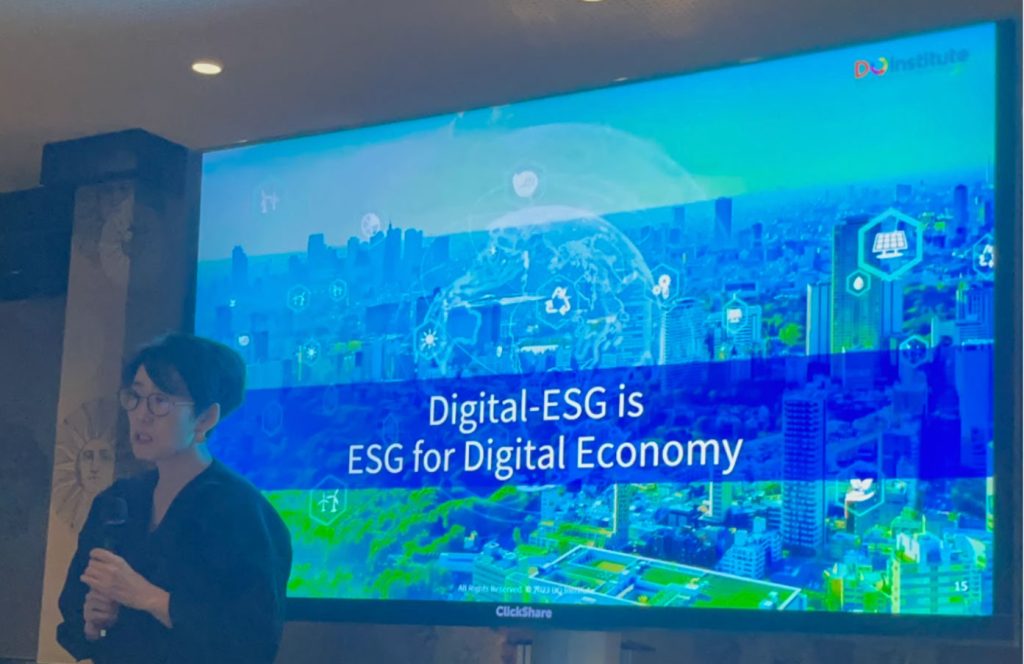Exploring Inclusive Digital-ESG and Material Transition to shape a Sustainable Future

The World Economic Forum in Davos has always been a platform for thought leaders and visionaries to share insights and strategies for shaping our future. On January 19th, 2023, Saudi Aramco and the DQ Institute, with the participation of Rystad Energy, presented innovative approaches in comprehending the value of carbon through digital solutions. This blog post will delve into the key highlights of this event and the promising concepts discussed.
Digital-ESG: Redefining Sustainability in the Digital Economy
The rapid digital transformation, particularly accelerated by the COVID-19 pandemic, has already revolutionized our world. The digital economy now accounts for a staggering 30% of the global economy, equivalent to USD 30 trillion in 2022*. This has created an urgent need to address sustainability challenges in conjunction with digital advancements. To meet this demand, the collaboration between Aramco and the DQ Institute has paved the way for an innovative framework called Digital-ESG. Building upon the Environmental, Social, and Governance (ESG) framework, Digital-ESG addresses the growing concerns about the negative impacts of technology on society and the environment, as well as the positive impacts of digital transformation on sustainability. Dr. Park emphasizes that while sustainability has traditionally focused on environmental, social, and governance issues, the rapid pace of digital transformation necessitates consideration of “Beyond-Sustainability”. The Digital-ESG framework aims to equip companies with the tools and guidance necessary to navigate the ever-changing digital landscape with transparency, accountability, and responsibility.
Digital-ESG offers a fresh perspective on inclusive and digitized ESG frameworks, aiming to measure the impact of an organization’s digital economy activities comprehensively. By addressing the blind spots in mainstream ESG reporting, this framework fosters a holistic understanding of the organization’s impact on sustainability. Aramco and the DQ Institute presented a case study on the Energy Sector, exploring the Cross Carbon Economy concept. This concept focuses on extracting value from carbon to create a global energy system that strikes a balance between affordable energy, energy security, and climate ambitions.
Material Transition: Understanding the Energy Transition’s Impact
Rystad Energy contributed valuable insights into material transition, aiming to enhance our understanding of the energy transition’s implications on global material demand. The research encompasses the examination of energy transition policies, environmental, social, and governance (ESG) issues, and geopolitical risks associated with key materials. To achieve this, Rystad Energy developed a comprehensive material demand model that includes extensive research on material usage across various sectors, with a particular focus on technologies such as solar PV, wind energy, and batteries used in electric vehicles and energy storage.
The detailed material demand model takes into account technological advancements, material substitution alternatives, and granular-level analysis, providing a comprehensive understanding of the future material landscape.
Taskforce on Digital-related Financial Disclosures (TDFD)
During her presentation, Dr. Park announced the launch of the Taskforce on Digital-related Financial Disclosures (TDFD) as the initial step in implementing the Digital-ESG framework. The TDFD is responsible for developing international standards that offer investors and other capital market participants guidance on companies’ digital-related risks and opportunities, allowing them to make informed decisions regarding their digital economy activities. These guidelines aim to bridge the gap by providing direction on Digital-ESG issues that should be disclosed, helping to establish a standardization for digital sustainability reporting.
The roundtable discussion stimulated insightful thoughts and received enthusiastic engagement and feedback from the participants. Attendees recognized two crucial dimensions for consideration. Firstly, they emphasized the importance of digitizing ESG indicators, enabling a more comprehensive assessment of sustainability. Secondly, they highlighted the significance of integrating digital-related risks and opportunities into sustainability guidelines, thereby incorporating Digital-ESG indicators as part of the common metrics the World Economic Forum plans to develop in the future.
As we navigate the challenges and opportunities presented by emerging technologies, it is vital to prioritize inclusivity, environmental sustainability, social impact, and responsible governance. By integrating these principles into our digital strategies, we can build a future where technology benefits all, leaving no one behind. This engagement led to a call to action for governments, businesses, and individuals to work together towards a more inclusive and sustainable Digital-ESG future.
*Source: AI Vital for Digital Economy. Financial Tribune: 2022
